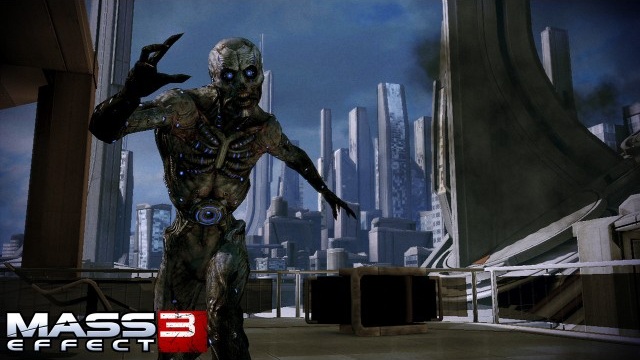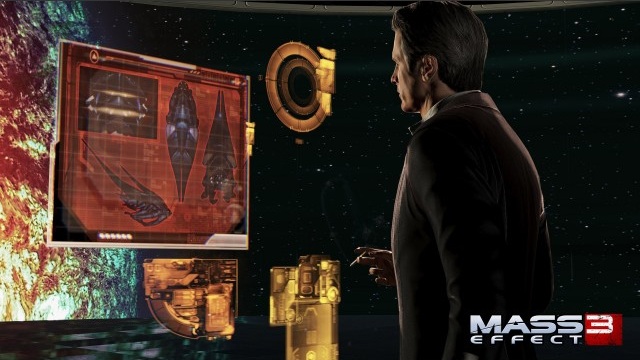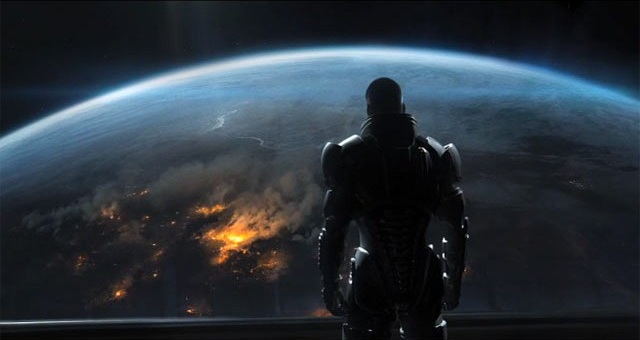If only for a while, if only for the twinkling of a tiny galaxy.
Commander Shepard isn't playing around anymore. Within the first hour of Mass Effect 3, Earth is ravaged by the Reapers, the colossal squid-like robots that he spends the first two Mass Effect games thwarting, seemingly to no avail. The Council still wallows in denial and idiotic bureaucracy. Even the Alliance has effectively stranded him on Earth and stripped him of the Normandy. It's not until the Reapers devastate the planet with giant red eye beams, the realization that no amount of human preparation would have been enough, that Shepard is re-enlisted into the Alliance, given the nigh-impossible mission of uniting the galaxy's forces, and forced to leave his homeworld as he squints at the Reapers with an intensity that would make even Clint Eastwood tremble.
Resolution, as it should, directs this final act of the Mass Effect trilogy. The tough decisions made in the first two acts will carry over, altering minor side quests, romantic dialogue sequences, and the overall galactic military strength against the Reapers. The favors you've done for your fellow aliens—turians, asari, krogan, salarian, rachni, geth, and quarian—will be called upon. Any party characters who joined your cause in the past, and survived, will appear once more either reprising their role as a potential squad member or offering a side mission that usually gives you a war asset and, at the very least, an opportunity to earn experience points.
Of course, your actions in Mass Effect 3 will have a far larger impact, as you scramble to forge alliances and ease tensions between alien races. With each race looking out for itself, you must follow through with any negotiated stipulations and play your political cards strategically to pull them to your side. Whether you choose the dialogue options of an empathetic Paragon or a badass Renegade, your reputation will bolster your chances of quelling the needless in-fighting so that everyone can focus on the much more imminent Reaper threat. Fully build the galaxy's military strength and you'll have a fighting chance in the final battle for Earth.
Without divulging any spoilers, anyone remotely invested in the characters and universe of Mass Effect (I am, especially after finishing Mass Effect 2 again one day before receiving Mass Effect 3) will be moved by the moments of courage and sacrifice throughout the story. Every once in a while, you'll pass through the second floor of the now Alliance-branded Normandy and peer at the war memorial, upon which the names of those who have died on the mission over the course of the trilogy have been carved. Thoughtful moments like these can be found in abundance here and fill the spaces of the plot beyond mere mission points.
Fighting through the homeworlds of several alien races elevates the importance of Shepard's ultimate goal as well as satisfies the curiosity of what they look like in the first place. Battlefields for major missions tend to be much wider and have a generous draw distance that highlights the destruction by the Reapers and the architecture of the environment, which along with the overall character modeling and much improved interface for health and shields, have been enhanced in detail.

Firefights also benefit from these enlarged maps in addition to the updated combat system that gives Shepard more movement and the entire party more options for skills and weapons. Sprinting can now be sustained, attacks can be evaded with a swift roll, the omni-tool can be turned into a strong strike, and switching from, to, and over cover is much more fluid. After importing Shepard's overall level from Mass Effect 2 (or playing New Game Plus), the skill tree has been expanded to cover six ranks, with the last three ranks providing an option between two enhancements. You can also tell your squadmates to perform skills via Kinect, though it's still much faster with the controller. If that weren't enough, you can further customize your armor and the entire party's weapons, which can be modded with better scopes, barrels, and magazine sizes found on the battlefield or purchased through a store.
Nothing speaks more for this overhaul than the multiplayer mode, which pits you in a team of four soldiers against eleven waves of enemies. This equivalent of Horde mode features five maps, three different sets of unfriendlies, and three difficulty settings. Completing specific tasks every three waves or so earns credits toward randomized packs of additional weapons and items as well as experience points toward your character's skill tree. It will also increase your galactic readiness percentage in the single-player story, though diligence in the single-player will easily fill the meter for military strength to its maximum.
Combining your strength with your teammates is the only way to survive, as reaching the final extraction point isn't easy even on Bronze. In fact, it would have better if the difficulty was turned down a notch, particularly when fighting against the Reaper horde. The ability to purchase Veteran and Spectre packs for a few Microsoft points also cheapens the effort some players will put into earning enough in-game credits to purchase them.

Also, the added attention to the homeworlds, the multiplayer maps, and the revised six-floored Citadel (they love to keep those Keepers busy) comes at an expense: other explorable cities. In Mass Effect 2, the Citadel, Ilium, and Omega cultivated depth in the similarities and differences between civilized and underground cities. Not only is their absence a missed opportunity—perhaps taken out as DLC later—that would have given more player freedom, but it also feeds into the game's sometimes claustrophobic design.
Completing Mass Effect 3 only takes 35 hours and that's after finishing every side mission available, whereas completing Mass Effect 2 took about 65 hours with DLC. It's difficult to say where the content went, as the Xbox 360 version of the game will ask you to swap disc one and disc two more than a Final Fantasy game on the original PlayStation. At least half of this comes from the lack of loyalty missions, which have been replaced more by updates and side missions where prior party characters aren't even temporary squad members. The reduction from an overblown party of ten (without DLC) in Mass Effect 2 to a party of six is a wise one, but not if the two new characters on the team don't even get a loyalty mission or a recruit mission. The ship just doesn't feel full.
The other half stems from the side missions given on the Citadel by way of eavesdropping on some troubled NPCs. Some utterance about a Prothean artifact, without having any in-depth dialogue tree, will activate an exploration quest similar to the mining mini-game in Mass Effect 2. Luckily, instead of the chore of mining, you only need to scan Reaper-infested solar systems while flying around and then scan any curious planets for the missing object or a lost or stranded fleet. The only worry is being chased by Reapers, but they're easily avoided. Still, the expedience of these tasks can be too brief, ironically.

The final point of contention is the metaphorical ending that feels disjointed and unfinished. The explanation for the cycle of Reaper destruction, the outro after the credits, and the symbolic rise from death to ascension are fine enough, but the lack of a detailed epilogue doesn't match the climax over the course of three games. No matter which option you choose, the open-ended finale turns out essentially the same. Without showing how all of the characters react, your decision becomes inconsequential. Making all of the options available for the ending may have been kind, but it essentially disregards your history of Paragon and Regenade choices completely. In terms of variance, the final mission and ending for Mass Effect 2 are stronger.
The technical and gameplay prowess of the long-awaited Mass Effect 3 cannot be denied. The improvements in combat, graphics, and multiplayer are definite, though that may have detracted from the last third of the game, which feels slightly stiff and rushed compared to the first two-thirds where uniting the alien races under a common goal brings a welcome resolution. Mass Effect 3 is like a comet: It may not last as long as you'd like and its trail may not be as brilliant as its coma, but it is a sight that no one can forget.
-
Brilliant story
-
...but lackluster ending
-
Improved combat system
-
Understandable HUD
-
Enhanced graphics
-
Multiplayer mode
-
On the short side
-
Can only explore The Citadel







